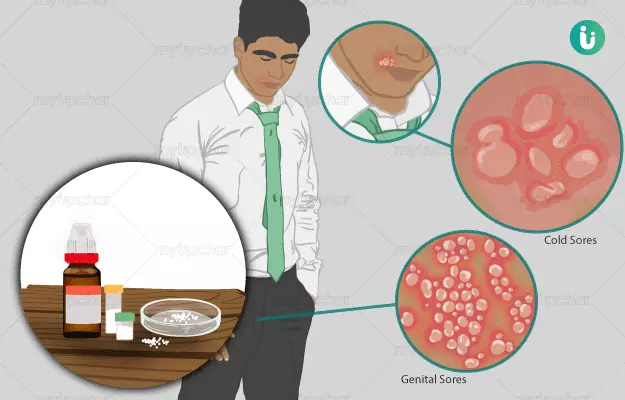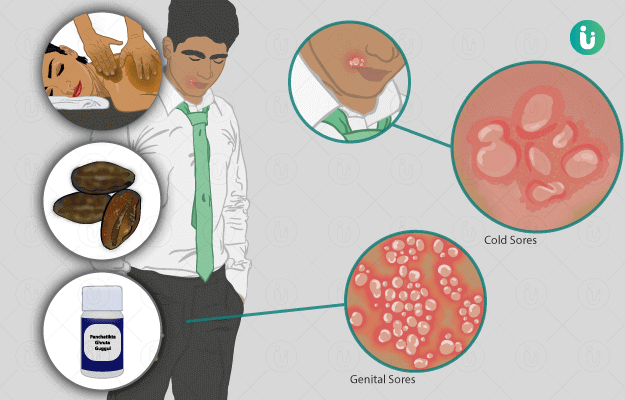Herpes infections are a type of viral infections that causes skin eruptions, specifically on the mouth and genitalia. There are two types of herpes virus strains that cause infections, HSV-1 and HSV-2. The infection starts with a fever, body ache, headache, a sick feeling and tiny red blisters appearing in clusters. There is tingling, burning, discomfort and itching in the area involved. HSV-1 causes lesions in and around the mouth and lips (cold sores or herpes labialis) and sores in the cornea of the eye (herpes simplex keratitis). HSV-2 causes genital lesions in and around the cervix, vagina, vulva, anus, groin, buttocks; these are painful, especially in the first infection. The virus can sometimes affect the eyes, brain or gastrointestinal tract. Although herpes infections are usually mild, occasionally, they may be life-threatening, especially in the case of a newborn baby or those with a weak immune system or with HIV infection.
A herpes simplex infection can spread through contact via the mouth, saliva or genitals of the infected person even if no active lesions are present. HSV-1 can sometimes cause genital lesions through oral-genital contact. HSV-2 is exclusively transmitted through sexual contact. An HSV-2 infection increases the risk of acquiring and transmitting an HIV infection.
After the first infection, HSV virus remains latent inside the body for the entire life. During latency, it may not cause symptoms. However, it may reactivate periodically by multiplying again, causing blisters and eruptions in the same area. Reactivation may be triggered by fever, emotional stress, menstruation or suppression of the immune system through drugs, physical trauma, dental procedure or overexposure of the lips to sunlight.
A herpes simplex infection is easily recognisable by its skin eruptions; however, in case of uncertainty, a swab is taken from the sore and sent for identification of the virus. Blood tests help to identify antibodies to HSV and to distinguish HSV-1 from HSV-2.
Homeopathic treatment helps relieve the acute lesions of herpes or the primary infection. Long-term treatment also reduces the recurrence of subsequent outbreaks. Common homoepathic remedies that are employed for the treatment of herpes include arsenic album, hepar sulphuris, graphites, mercurius solubilis, natrium muriaticum, petroleum, rhus toxicodendron and sepia officinalis. The dosage of a remedy is prescribed on the basis of each individual case.
































